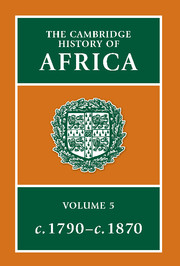Book contents
- Frontmatter
- Introduction
- 1 Egypt and the Nile Valley
- 2 Ethiopia and the Horn
- 3 The Maghrib
- 4 The nineteenth-century jihads in West Africa
- 5 Freed slave colonies in West Africa
- 6 West Africa in the anti-slave trade era
- 7 The forest and the savanna of Central Africa
- 8 East Africa: the expansion of commerce
- 9 The Nguni outburst
- 10 Colonial South Africa and its frontiers
- 11 Tradition and change in Madagascar, 1790–1870
- 12 Africans overseas, 1790–1870
- 13 Changing European attitudes to Africa
- Bibliographical Essays
- Bibliography
- Index
- References
3 - The Maghrib
Published online by Cambridge University Press: 28 March 2008
- Frontmatter
- Introduction
- 1 Egypt and the Nile Valley
- 2 Ethiopia and the Horn
- 3 The Maghrib
- 4 The nineteenth-century jihads in West Africa
- 5 Freed slave colonies in West Africa
- 6 West Africa in the anti-slave trade era
- 7 The forest and the savanna of Central Africa
- 8 East Africa: the expansion of commerce
- 9 The Nguni outburst
- 10 Colonial South Africa and its frontiers
- 11 Tradition and change in Madagascar, 1790–1870
- 12 Africans overseas, 1790–1870
- 13 Changing European attitudes to Africa
- Bibliographical Essays
- Bibliography
- Index
- References
Summary
POLITICAL, SOCIAL AND ECONOMIC CONDITIONS BEFORE 1830
It is customary to link together the different states of north-west Africa, the Maghrib. But they were, in fact, very varied. They differed from each other and they did not constitute any form of political unity. Turkish suzerainty existed over Algiers and Tunis, but not over Morocco.
This suzerainty was, as it has often been described, largely fictive and mainly ceremonial, but it did have some real meaning. It was in Istanbul, in Smyrna and in Anatolia that the governments of Algiers and Tunis recruited their garrison troops (the ojaq). When the Porte was in peril in some way (as in 1795 against Tripoli, in 1810 against Crete, and most notably at the time of the Greek war of independence), then it received assistance from its vassals. Morocco, which was fully independent, was a country where political unrest and agitation were frequent. The sovereign was a hereditary monarch, but he had to be proclaimed sovereign by the different tribal and military units which covered most of the territory, as well as by the principal town organizations. In a sense therefore it could be said that the Moroccan monarchy was also elective. There had been many succession struggles; regional and local preoccupations could express themselves through the issue of a sovereign's proclamation; at times, revolt can almost be described as endemic, particularly during the rule of Mulay Sulayman (1792–1822). In the regency of Algiers the dey was chosen by the Turkish garrison.
- Type
- Chapter
- Information
- The Cambridge History of Africa , pp. 99 - 124Publisher: Cambridge University PressPrint publication year: 1977

